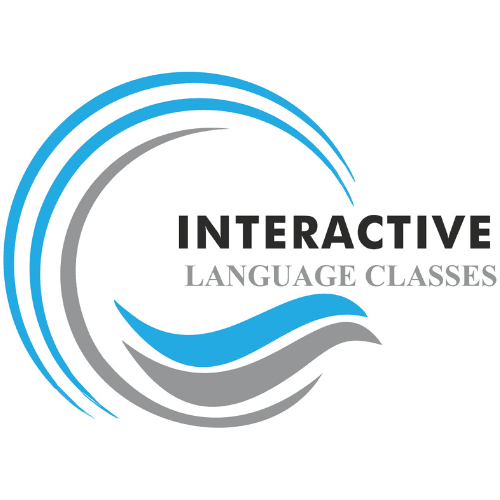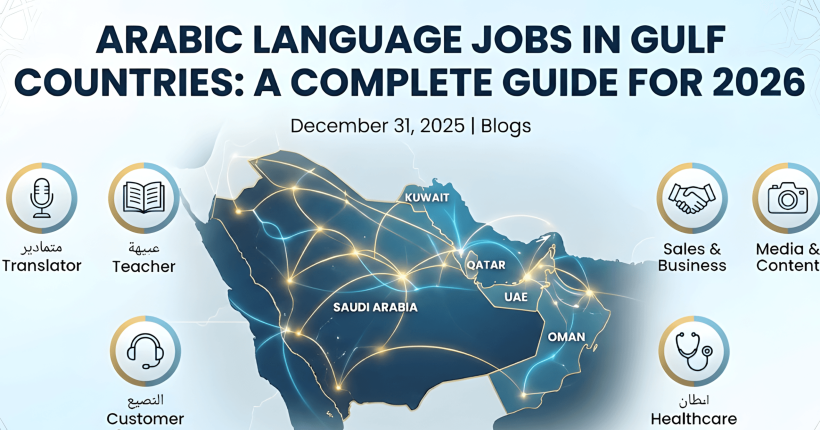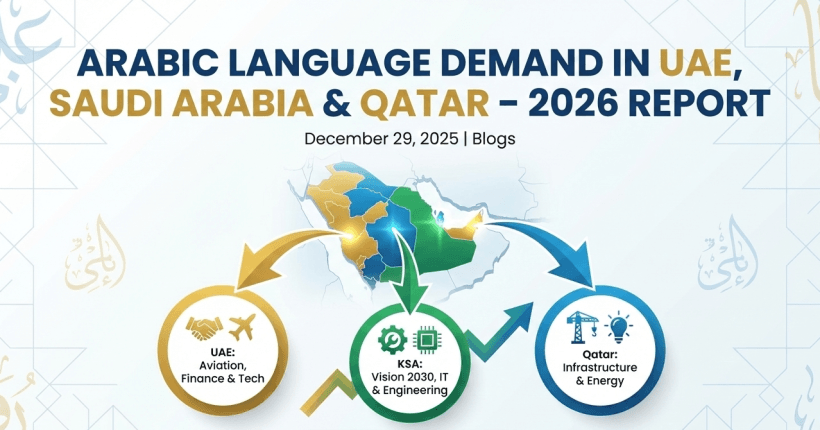No products in the cart.
by Abdul Mohaimen (Director, ILC)

Introduction:
Welcome to Interactive Language Classes, where learning a language is more than just mastering vocabulary—it’s about embracing new cultures, understanding histories, and unlocking global opportunities. Today, we’re exploring the Arabic language, which serves as a bridge to a rich cultural heritage, a deeper understanding of faith, and numerous career opportunities.
Arabic is one of the world’s oldest and most widely spoken languages, and by learning it, you’re opening doors to countless possibilities. Let’s dive into the significance of the Arabic language, its connection to Islam, job prospects, and how you can master it with Abdul Mohaimen.

The Arabic Language: A Global Bridge
Arabic is spoken by over 400 million people across 26 countries, predominantly in the Middle East and North Africa (MENA) region. The reach of Arabic goes beyond geography, influencing various aspects of global culture, economy, and diplomacy.
Where Is Arabic Spoken?
Arabic is the official language in numerous countries across the world, primarily in:
- Middle East: Saudi Arabia, Egypt, Jordan, Lebanon, Iraq, Syria, UAE, Qatar, etc.
- North Africa: Morocco, Algeria, Tunisia, Libya, Sudan, Mauritania, etc.
- Other Regions: Parts of the Horn of Africa (Somalia, Djibouti), and among migrant communities worldwide.
Arabic is also an official language of major international organizations such as the United Nations and the Arab League.

Why Should You Learn Arabic?
Learning Arabic is much more than acquiring a new language—it’s about connecting with a world of opportunities, history, and culture. Here are some compelling reasons why learning Arabic is essential:
1. Cultural Significance
Arabic is the language of ancient civilizations, from the Islamic Golden Age to the poetry of Rumi and the philosophy of Averroes. It opens doors to understanding:
- Islamic Art & Architecture
- Arabic Literature & Poetry
- Traditional Music, Dance, and Cuisine
Explore more about Arabic culture through Arabic Literature.
2. Religious Importance
Arabic holds profound religious significance. For over 1.8 billion Muslims worldwide, it is the language of prayer (Salah), the Quran, and other sacred texts. Even if you’re not religious, learning Arabic allows for a deeper understanding of Islamic heritage.
Arabic and Islam:
- The Quran: The holy book of Islam is written in Arabic. Understanding it in its original form enriches spiritual and intellectual insight.
- Daily Prayers (Salah): Muslims recite prayers in Arabic every day.
- Islamic Scholarship: Many classical Islamic texts, from theology to law, are in Arabic.
3. Career Opportunities
Arabic is the 6th most spoken language in the world, making Arabic-speaking professionals highly sought after across a wide range of industries:
- International Business & Trade
- Diplomacy & Foreign Affairs
- Translation & Interpretation
- Media & Journalism
- Education & Academia
- Tourism & Hospitality
- Intelligence & Security
Arabic offers a competitive edge in global job markets, especially in the MENA region, where booming economies require skilled Arabic professionals.
4. Travel & Exploration
Arabic unlocks the beauty of travel, from the bustling markets of Marrakech to the majestic pyramids of Egypt. Speaking Arabic enhances travel experiences and helps you connect with locals, uncovering cultural gems and hidden histories.

Arabic and Islam: A Sacred Connection
Arabic is intrinsically tied to the Islamic faith. It’s not just a language but a cultural and spiritual anchor for millions of people.
Why Arabic Matters in Islam:
- The Quran: The holy book of Islam is written in Arabic. To understand it in its purest form, one must understand Arabic.
- Daily Prayers (Salah): Arabic is the language of prayer for Muslims around the world.
- Islamic Scholarship: Many classical Islamic texts are written in Arabic.
Arabic also plays a key role in Islamic culture:
- Calligraphy: Arabic calligraphy is a revered art form admired worldwide.
- Architecture: Iconic Islamic structures, such as the Alhambra and Taj Mahal, feature Arabic inscriptions.
- Language of Peace: Arabic fosters dialogue and understanding across diverse cultures.
Learn more about Arabic Calligraphy.

Jobs and Scope for Arabic Speakers
The demand for Arabic speakers has grown significantly, especially due to the rapid development of the Middle East and North Africa. Here are some career paths for Arabic speakers:
- International Business & Trade: Arabic-speaking professionals are needed in companies dealing with MENA countries.
- Diplomacy & Foreign Affairs: Work with embassies, UN agencies, and international organizations.
- Translation & Interpretation: Arabic translators are in high demand for legal, medical, and literary fields.
- Media & Journalism: Arabic-speaking journalists and reporters are required by global media outlets.
- Education & Academia: Teach Arabic or Islamic studies at universities worldwide.
- Tourism & Hospitality: Arabic speakers can work as tour guides, hotel staff, or travel managers.
- Intelligence & Security: Government agencies need Arabic experts for analysis and translation.
Why Arabic Is a Career Asset:
- High Demand: Arabic is critical for global business and diplomacy.
- Global Network: Arabic connects you to a professional network spanning the Arab world.
- Lucrative Opportunities: Many jobs requiring Arabic offer high salaries, particularly in the Gulf region.

Learn Arabic with Interactive Language Classes
At Interactive Language Classes, we believe in making language learning fun, practical, and personalized. Our Arabic courses are tailored to meet the needs of various learners, whether you’re pursuing Arabic for travel, work, religious studies, or personal growth.
Why Choose Us?
- Expert Teachers: Learn from experienced instructors, including Abdul Mohaimen, a skilled Arabic expert.
- Interactive Lessons: Engage in dynamic, real-life conversations and immersive cultural activities.
- Flexible Learning Options: Choose from live online classes, self-paced courses, or one-on-one sessions.
- Tailored Curriculum: Learn Modern Standard Arabic, dialects like Egyptian, Levantine, Gulf Arabic, or focus on Islamic Arabic.
Our course offerings include:
- Beginner’s Arabic: Learn the alphabet, basic vocabulary, and conversational skills.
- Conversational Arabic: Practice real-life dialogues and daily communication.
- Business Arabic: Learn the language of corporate settings and negotiations.
- Islamic Arabic: Dive into Quranic Arabic, Islamic texts, and theological studies.
- Dialect-Specific Classes: Master Egyptian, Levantine, Gulf Arabic, and more.
Meet Abdul Mohaimen: Your Arabic Language Mentor
Abdul Mohaimen is a passionate Arabic language instructor who brings years of experience to his teaching. His interactive approach focuses on:
- Practical communication skills
- Cultural immersion activities
- Personalized learning paths
Abdul’s enthusiasm and expertise make learning Arabic an engaging experience.
Student Testimonials
“Learning Arabic with Abdul Mohaimen was a transformative experience. The lessons were interactive, engaging, and practical. I feel confident speaking Arabic in both professional and personal settings.” — Sarah T.
“I’ve always wanted to understand the Quran in its original language. Thanks to Interactive Language Classes, I not only learned Arabic but also gained a deeper appreciation for Islamic culture.” — Salim Ahmad
Ready to Start Your Arabic Journey?
Whether you’re learning Arabic for personal growth, travel, religious studies, or career advancement, Interactive Language Classes is here to support you on every step of your journey.
Book a Free Trial Class with Abdul Mohaimen today and unlock the beauty of the Arabic language.
Related Posts:
- Master French with ILC: Your Roadmap to Language Proficiency
- How to Learn a New Language Faster
- Top 10 Mistakes Language Learners Make and How to Avoid Them










